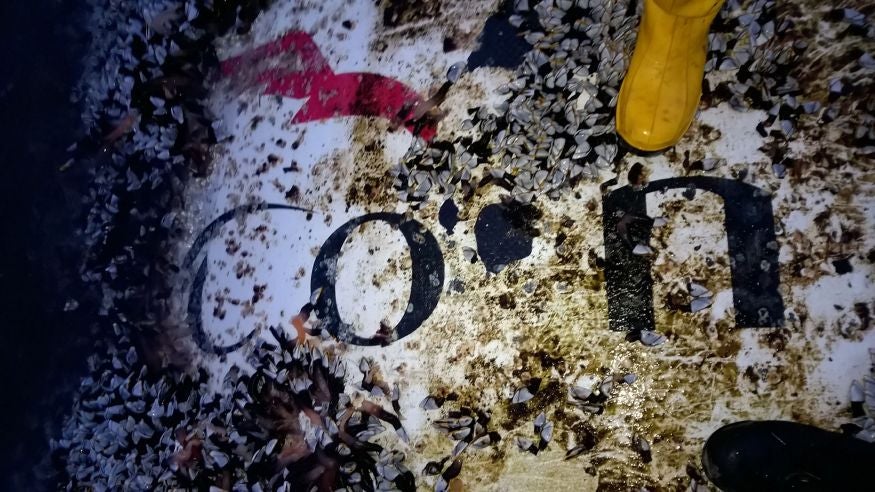SpaceX Falcon-9: Crashed space rocket hauled from sea off Cornwall coast covered in barnacles
'The unmanned rocket exploded just 2 minute and 21 seconds after launch'
Your support helps us to tell the story
From reproductive rights to climate change to Big Tech, The Independent is on the ground when the story is developing. Whether it's investigating the financials of Elon Musk's pro-Trump PAC or producing our latest documentary, 'The A Word', which shines a light on the American women fighting for reproductive rights, we know how important it is to parse out the facts from the messaging.
At such a critical moment in US history, we need reporters on the ground. Your donation allows us to keep sending journalists to speak to both sides of the story.
The Independent is trusted by Americans across the entire political spectrum. And unlike many other quality news outlets, we choose not to lock Americans out of our reporting and analysis with paywalls. We believe quality journalism should be available to everyone, paid for by those who can afford it.
Your support makes all the difference.A bus-sized fragment of the unmanned SpaceX cargo rocket which exploded minutes after launch in June has been towed from the sea off the Isles of Scilly some 2,000 miles from its launch pad at the Kennedy Space Centre in Cape Canaveral, Florida.
Covered in gooseneck barnacles, the 10 metre (32ft) by 4m (13ft) section of a Falcon-9 rocket was spotted by local boatmen bobbing about in the water like a dead, shell-encrusted whale between Bryher and Tresco.
It was towed onto a nearby beach and steam-cleaned to reveal the American flag and its metal identification plate. SpaceX, the private company that owned the spacecraft, confirmed the fragment came from its Falcoln 9 rocket – one of the more unusual items of flotsam and jetsam carried east by the North Atlantic drift from the Caribbean Sea.
“The markings show an American flag. It looks like it’s an American rocket and is similar to the unmanned Space X Falcon 9 which blew up shortly after take-off from Cape Canaveral in June,” said Martin Leslie, a local coastguard.
The unmanned rocket exploded just 2 minute and 21 seconds after launch and was carrying 4,000 pounds of supplies and equipment destined for the International Space Station. Experts believed the rocket’s liquid oxygen fuel tanks may have burst under high pressure, causing an explosion that scattered debris over a wide area of sea.

It is not unusual for space debris to turn up in places far away from where a rocket was launched.
In August, a rocket fragment the size of a mattress was washed up on a Florida beach near Fort Lauderdale. It had not come from nearby Cape Canaveral but the European spaceport near Kourou in French Guiana, on the other side of the Caribbean Sea.
The Americans and Europeans both launch rockets over the sea which means that fuel tanks and disposable rocket stages – and everything else in a failed launch – can be carried for thousands of miles by ocean currents.
In April 2014, part of a “launch vehicle payload shroud” from a European satellite launch ended up being lifted out of the Amazon by startled fishermen. The UK Space Agency confirmed that the debris was from the rocket that successfully launched a commercial satellite, suggesting that it had probably floated back inland after falling into the Atlantic miles from the coast.
Both China and Russia, meanwhile, launch their rockets over land which can cause problems for the inhabitants below. In August, the discarded rockets motors of the first stage of a Long March 4C rocket launched from the Taiyuan, Shanxi Province, launch site in China fell through the roof of a house – apparently with no injuries to the inhabitants.
While in January, a discarded rocket stage fell on a rural road near the small town of Fuquan in southwest China’s Guizhou Province, some 300 miles from the launch pad where the rocket had taken off.
Russia, with a much longer history of rocket launches, has amassed a huge inventory of lost space detritus, some of it toxic, that has fallen to the ground.
Discarded fuel tanks, rocket motors and booster stages are even said to support a small industry of scrap metal dealers who have sprung up after the former Soviet Union abandoned its policy of trying to retrieve the spent rocket stages beneath the flight path running east from the Baikonur Cosmodrome in Kazahkstan.

Join our commenting forum
Join thought-provoking conversations, follow other Independent readers and see their replies
Comments